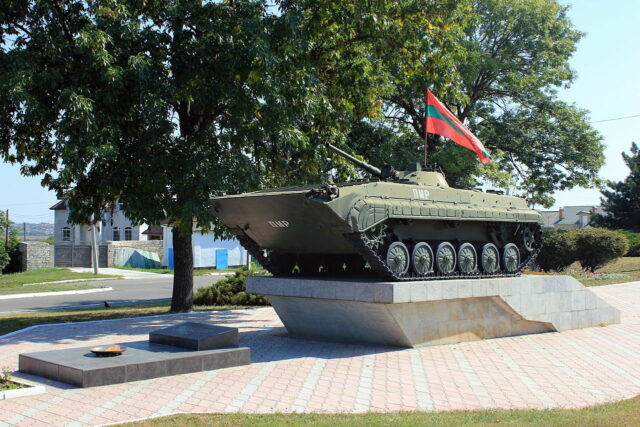
Geopolitical Report ISSN 2785-2598 Volume 39 Issue 9
SpecialEurasia OSINT Team
Recent Transnistria’s appeal for protection to Russia has elevated the regional geopolitical risk, underscoring the precarious situation in Moldova. Transnistria, also known as the Pridnestrovian Moldavian Republic (PMR), has sought Moscow’s aid in response to alleged pressure from the Moldovan government.
With over 220 thousand ethnic Russians living in the self-proclaimed republic, the Russian Foreign Ministry swiftly accepted the request. Despite Chisinau dismissing it as mere propaganda, the looming possibility of a military intervention by the Kremlin casts a shadow over the situation.
This development has garnered global attention, raising concerns about potential destabilisation and Russian intervention not only in Transnistria but also in the broader Black Sea region.
Background Information
Tiraspol’s government has formally requested assistance from Russia, citing mounting pressure from the Moldovan government. Over 220 thousand Russian citizens permanently reside in Transnistria, justifying the appeal based on the positive experience of Russian peacekeeping in the region.
The Moldovan government denies the threat of escalation, attributing the events to the left side of the Dniester and Kremlin machinations. However, international leaders, including Polish Prime Minister Donald Tusk, complain about the permanent threat of Russian intervention, emphasising the broader implications for regional stability.
Russian officials assert that the appeal implies primarily economic help, with no mention of military support. The Federation Council contemplates options for responding, possibly involving humanitarian assistance.
Transnistria:
Geopolitical Scenario
The complex history of Transnistria intricately weaves its geopolitical scenario, stemming from the disintegration of the Soviet Union. As a breakaway state in the eastern region of Moldova, Transnistria declared independence in 1990, triggering a brief war in 1992. The resulting ceasefire established a peacekeeping force comprising Russian, Transnistrian, and Moldovan troops.
Despite operating as a de facto independent state with its own government, currency, and security forces, the self-proclaimed republic remains economically and politically dependent on Russia. The territorial dispute concerning Moldova’s status hampers the efforts to find a resolution.
A key point of contention lies in the conflicting perspectives on Transnistria’s status. Moldova maintains its territorial integrity, while Transnistria seeks recognition as an independent state. This fundamental disagreement serves as a significant hurdle in resolving the conflict.
Russia’s involvement exacerbates the situation, with Moscow providing military presence, economic aid, and political support to Transnistria. Western countries view this support as an impediment to achieving a peaceful resolution, contributing to the overall complexity of the region. By contrast, the Kremlin underlines that its support is necessary for the survival of Transnistria’s population and the fate of over 220 thousand Russians.
The EU provides financial help to Moldova and encourages dialogue between Moldova and Transnistria. However, the fundamental disagreement over Transnistria’s status and Russia’s influential role persists, impeding progress. Concerns have arisen regarding Transnistria’s potential role in harbouring criminal elements and serving as a transit point for illegal goods.
Reports of Russian military exercises in the region have added another layer of complexity, raising fears of potential instability.
Read also | Moldova applied for EU membershipblack |
Why Does It Matter?
The potential for another Russian military intervention could not only escalate the confrontation between Russia and the West, but also jeopardise the stability of the broader Black Sea region. Moldova’s pursuit of EU membership, with candidate status granted in June 2022 and accession negotiations started in December 2023, intensifies the geopolitical landscape.
If the West’s assertions about Russia’s expansionist goals are accurate, the Black Sea region, along with Transnistria, becomes a critical area for Moscow’s strategic interests.
This aligns with concerns that Russia aims to establish a buffer zone, preventing NATO and Western expansion to the east. As Moldova inches closer to the EU, the potential for Russian intervention to support Transnistria becomes a tangible threat, affecting not only Moldova’s sovereignty but also regional stability.
The West’s stance that Russia’s ambitions extend beyond Ukraine underscores the gravity of the situation. As Moldova navigates its path towards European integration, the risk of external interference looms large.
On the other side, one might also consider Tiraspol’s request for Russian help as Kremlin pressuring Chisinau because of Moldova’s stance on EU membership.
Robust diplomatic efforts are essential to de-escalate tensions, encourage peaceful dialogue, and safeguard the sovereignty of nations in the face of geopolitical challenges.
*Updated: February 28th, 2024 – Time: 11:00 PM CET
For those with an interest in acquiring comprehensive insights into the geopolitical and economic dynamics of the Black Sea and Chisinau-Tiraspol’s tension, we encourage you to reach out to SpecialEurasia by emailing info@specialeurasia.com. We are ready to assist you in evaluating the possibility of acquiring a carefully crafted and customised report to meet your intelligence requirements.



